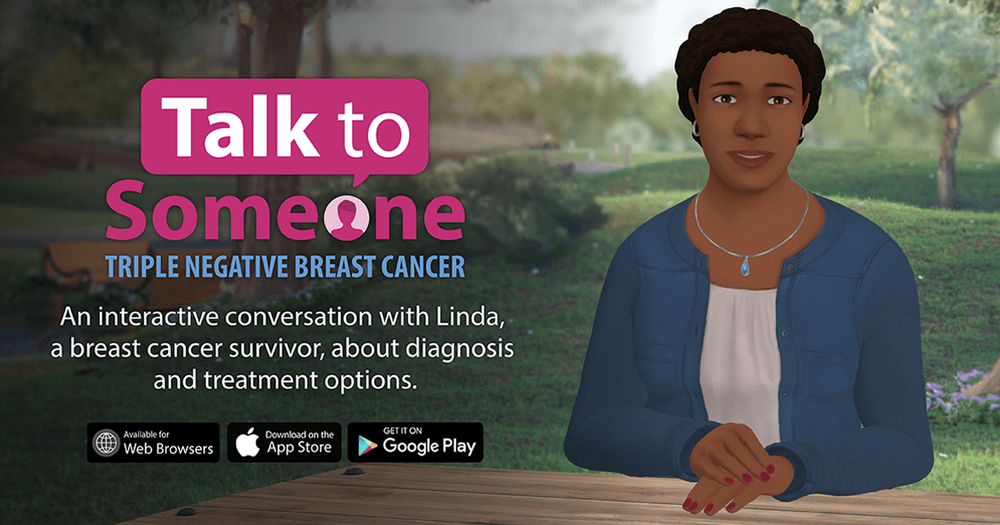CANCER
Innovative Communication Work
INTERACTIVE CANCER EDUCATION TOOLS FOR PATIENTS AND SURVIVORS
Surviving cancer is an enormous accomplishment. Staying healthy to live an active, productive life is the next step in any survivor’s journey. The National Association of Chronic Disease Directors (NACDD) and the Centers for Disease Control and Prevention (CDC) have developed engaging, interactive coaching conversations with computer animated virtual humans that will answer your questions and guide you to a life of continued health. To learn more about these tools visit, conversationsaboutcancer.org.
THE NACDD INNOVATIVE COMMUNICATION IN CANCER PREVENTION AND CONTROL PROJECT
The NACDD Innovative Communication in Cancer Prevention and Control project focused on two health communication scenarios for the Southeastern United States. In the first scenario, public service announcements featuring Joan Lunden addressing Triple Negative Breast Cancer and a virtual reality simulation named, “Talk to Someone: Triple Negative Breast Cancer,” provided new tools for healthcare professionals and public health practitioners in need of innovative ways to help people make decisions about healthcare. In the second scenario, two colorectal cancer public service announcements that encourage adults to receive proper screening for colorectal cancer were broadcast in outpatient waiting rooms by CBS and Health Media Network.

INCREASING HEALTHY BEHAVIORS AMONG CANCER SURVIVORS IN RURAL COMMUNITIES
As the number of cancer survivors increases, their long-term health outcomes have become an important issue. Studies reflect cancer survivors who engage in multi-component, evidence-based wellness behaviors, such as tobacco use cessation, stress and relaxation activities, improved nutrition, and increased physical activity have improved quality of life, physical function, and reduced fatigue. Rural cancer survivors typically experience limited or no availability or access to suitable wellness programs.
NACDD, CDC, and five community-based organizations collaborated to implement a multi-component wellness program in rural communities using the framework outlined by the “Comprehensive Cancer Control Guidance for Developing Cancer Survivor Wellness Programs.” NACDD provided technical assistance to the community-based organizations through a series of seven webinars that highlighted the processes of the framework. Two webinars and four success stories share the results of the project.
WEBINARS
SUCCESS STORIES
- Cancer Association of New Orleans (Louisiana): Innovations to Increase Healthy Behaviors Among Rural Cancer Survivors
- Little Red Door (Indiana): Innovations to Increase Healthy Behaviors Among Rural Cancer Survivors
- Nebraska Cancer Coalition: Innovations to Increase Healthy Behaviors Among Rural Cancer Survivors
- Mississippi State Department of Health: Innovations to Increase Healthy Behaviors Among Rural Cancer Survivors
NEEDS ASSESSMENT ON SKIN CANCER MESSAGING: AFRICAN-AMERICAN AND HISPANIC ADULTS
 An NACDD-conducted needs assessment on skin cancer messaging aimed at African-American and Hispanic adults aged 18-44 years, included holding focus groups with 159 participants. The assessment provided guidance on whether to adapt or develop materials and messages and guided the methods of delivery for meeting the needs of both target populations.
An NACDD-conducted needs assessment on skin cancer messaging aimed at African-American and Hispanic adults aged 18-44 years, included holding focus groups with 159 participants. The assessment provided guidance on whether to adapt or develop materials and messages and guided the methods of delivery for meeting the needs of both target populations.
PROVIDER SIMULATION FOR SURVIVOR DISTRESS SCREENING
Studies show that few specialty or primary care providers of cancer care are engaging in routine discussions with patients about psychosocial concerns or treatment options. To address this treatment gap, NACDD and CDC’s Division of Cancer Prevention and Control are partnering and leveraging the expertise of Kognito to develop an interactive, online, CME-accredited, health simulation training for healthcare providers to teach them how to have discussions about mental health distress management and to provide supportive resources for cancer survivors.
- Provider Education Training to Improve Mental Health Care of Cancer Survivors – CDC
- Provider Education for Mental Health Care of Cancer Survivors – Kognito
- Provider Education for Mental Health Care of Cancer Survivors – Kognito: Course Summary
- Provider Education for Mental Health Care of Cancer Survivors – Kognito: Amelia Ballard
- Provider Education for Mental Health Care of Cancer Survivors – Kognito: Mari Brick
- Provider Education for Mental Health Care of Cancer Survivors – Kognito: James Brewer-Calvert
- Provider Education for Mental Health Care of Cancer Survivors – Kognito: Brock Lamont
Working with Kognito, a health simulation company, and Westat, a research and analysis firm, NACDD is exploring innovative ways for healthcare providers to communicate complex health information about early onset breast cancer and breast health to women younger than 45 years of age who are making decisions about their care. The objective is development of two role-play conversations with virtual humans, one for providers for educational purposes and another for women under 45 years of age who have questions about their risk factors for breast cancer.
